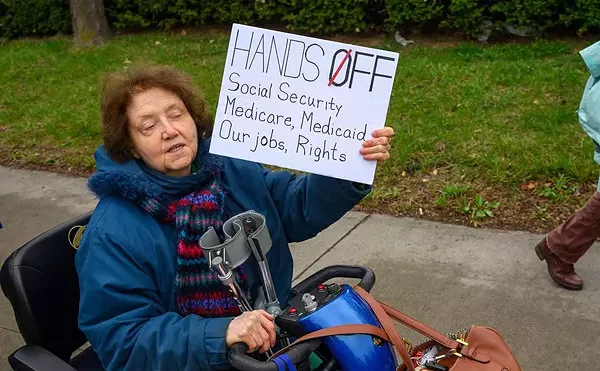
Audio By Carbonatix
[
{
"name": "GPT - Leaderboard - Inline - Content",
"component": "35519556",
"insertPoint": "5th",
"startingPoint": "3",
"requiredCountToDisplay": "3",
"maxInsertions": 100,
"adList": [
{
"adPreset": "LeaderboardInline"
}
]
}
]
Eight months after Detroit voters approved a living wage ordinance for employees of city contractors, the Archer administration hasn’t finalized its enforcement mechanism for it.
But for supporters of the living wage referendum drive, the larger question is whether the living wage will be wiped away by state legislation.
Voted into law in November, the living wage ordinance requires employers who receive $50,000 or more in annual city contracts to pay a minimum hourly wage of about $8.35 with health care or $10.44 without health care. Mayor Dennis Archer initially supported the drive, then urged its defeat at the polls when opposition surfaced from the business community and some nonprofit groups.
Carolyn Abney, manager of purchasing for the city, said that the purchasing department will hold a public hearing about the ordinance and those affected by it within 45 days. Meanwhile, purchasing is awaiting the law department’s final approval of a complaint procedure.
"We’re still in the early stages," Abney added. When the procedure is in place, purchasing issues certificates of compliance, which companies seeking city contracts have to submit with their contract bids, Abney said.
Mike Karwoski, a senior representative of the city law department, said penalties under the ordinance can require an employer found in violation to compensate workers for the difference in lost wages, or ban repeat offenders from contracting with the city for as long as 10 years.
Work Fairness, one of the groups behind the referendum, has visited sites where city contract workers were employed and seen the lack of compliance firsthand, organizer Jerry Goldberg said.
"We didn’t meet anybody who was making what they should have been making, and, of course, there were no postings," he added. "The city should enforce it, but none of us has confidence that the city will do it," said Goldberg.
Goldberg wants local unions to take the lead in creating an independent monitoring procedure, but metropolitan Detroit AFL-CIO President Ed Scribner says the priority is to muster support for the wage among elected officials.
Both the Detroit Regional Chamber of Commerce and the Michigan Chamber of Commerce have called for state legislation to void the living wage. The Detroit chamber released a study arguing that the living wage would effectively tax firms that hire low-skilled workers, inhibiting job creation.
The report by Public Sector Consultants Inc. of Lansing also said the city might see increased costs for services and spend $4.2 million a year to enforce the program.
Rep. Andrew Richner (R-Grosse Pointe Park) and Rep. Robert Gosselin (R-Troy), following complaints from the chambers and indications that Gov. John Engler would support such a law, have introduced legislation to nullify the living wage.
"We have our own campaign going," Scribner said. "I sent out a letter to every senator, relative to our position and what we think their position should be. We hope to convince them of the fairness and importance of the wage, which is designed to lift little people up, and raise the living standards of the community."
Scribner says he has been pleased to receive backing for the wage from suburban representatives, such as Sen. Gary Peters (D-Bloomfield Township).
"He supports it, especially because it was passed by the local citizens," said Andy Shor, a legislative aide to Peters.
Thirty cities throughout the country have already approved living wage ordinances, Scribner added. The laws are significant, he said, because increases in the federal minimum wage haven’t kept pace with inflation for many years.
Detroit City Council members Maryann Mahaffey and Ken Cockrel both said they were opposed to the rumblings in Lansing.
"I believe it is a matter of home rule, and the state should not interfere," said Mahaffey.
And while Cockrel acknowledged complaints that the living wage puts Detroit at a competitive disadvantage, he said he still believes the concept is good and that the issue is for Detroit, not Lansing.
"If we have a problem in Detroit, Detroiters should fix it," he said.





